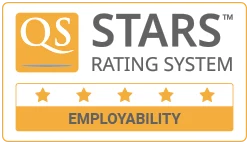1- General Documents
- Enrolment form for the Master’s Degree at the ESERP Business School, filled out and signed by the interested party.
- A photocopy of the applicant’s passport, Spanish ID or national identity card from a European country. The photocopy must be verified at ESERP by submitting the original.
- 1 passport-sized colour photograph (if sent by e-mail, it must be in high-resolution).
- Updated Curriculum Vitae in Spanish or English.
- Cover letter in Spanish or English.
- Enrolment fees: You must send proof of having made the first payment, which must include the enrolment fee.
- The applicant must demonstrate their language skills for the language in which the Master’s Degree is taught, by means of a certificate or interview.
- Submission of original documents upon arrival at the school.
2- Access requirements for the ESERP Business School’s programmes and degrees
One of the following requirements must be met in order to access the ESERP’s Master’s & MBA programmes and degrees:
- Employment History Record.
- Or, with a letter with the letterhead signed and stamped by the company, which verifies the amount of time the individual has worked for the company and the position held. More than one letter may be submitted from various companies, provided that the total amounts to 4 years.
- Access with a University Degree of 180 ECTS credits or equivalent.
3- Access requirements to obtain degrees issued by Partner Universities
The ESERP Business School offers the possibility of obtaining a double degree from the various universities and institutions with which it has established educational collaboration agreements.
- Submit the original degree to have a certified copy made at the school.
- In its absence, you can submit the original of your European Diploma Supplement (EDS) or its equivalent; Diploma Supplement (DS), or Europass Certificate Supplement (ECS).
- Submit the original degree to have a certified copy made, as well as an academic transcript.
- In its absence, you can submit the original of your European Diploma Supplement (EDS) or its equivalent; Diploma Supplement (DS), or Europass Certificate Supplement (ECS).
*(EHEA)http://www.ehea.info/pid34250/members.html
Requirements for applicants with degrees from a foreign University Institution
In the event that the studies used to pre-enrol in the Master’s Degree have been completed at an EHEA institution, both the degree and the academic transcript (grades) must be official and issued by the competent authorities, in accordance with the legal system of the country of origin.
– The following requirements must also be met:
- Legalisation. Only for degrees from university institutions in countries that are not members of the EU and that belong to the EHEA.
- Legalised translation of documents that have not been issued in Spanish, Catalan, English, French, Italian or Portuguese.
Legalisation process for academic documents issued abroad (non-EU member countries)
Information concerning the legalisation process must be provided by the university where the studies have been completed, by the competent authorities or by the consular services in the country of origin where the documents come from.
The steps to follow to legalise these documents and, therefore, in order for them to be valid in Spain will vary according to the country of origin where the studies or degrees were obtained, depending on whether there is any applicable international agreement.
- Countries that have signed the Hague Convention of 05/10/1961:
Apostille: The competent authorities in the country must verify the signatures of the academic directors and must issue the relevant Apostille.
The Apostille must be placed on the original document.
Hague Convention Countries
- Submission of the official degree and personal academic transcript, both legalised, that demonstrate the student’s eligibility to access post-graduate studies.
- In its absence, a document issued by the university that accredits this.
Requirements for applicants with a degree from a foreign University Institution:
In the event that the studies used to pre-enrol in the Master’s Degree have been taken at a foreign higher education institution, both the degree and the academic transcript (grades) must be official and issued by the competent authorities, in accordance with the legal system of the country of origin.
The following requirements must also be met:
- Legalisation. Only for degrees from university institutions in non-EU territories and that do not belong to the EHEA.
- Translation of documents that have not been issued in Spanish, Catalan, English, French, Italian or Portuguese.
Legalisation process for academic documents issued abroad:
Information concerning the legalisation process must be provided by the university where the studies have been completed, by the competent authorities or by the consular services in the country of origin where the documents come from.
The steps to follow to legalise these documents and, therefore, in order for them to be valid in Spain will vary according to the country of origin where the studies or degrees were obtained, depending on whether there is any applicable international agreement.
The different legalisation procedures are the following:
A) Countries that have signed the Hague Convention of 05/10/1961:
Apostille: The competent authorities in the country must verify the signatures of the academic directors and must issue the relevant Apostille.
The Apostille must be placed on the original document.
Hague Convention Countries
B) Countries that have signed the Andrés Bello Agreement(Bolivia, Chile, Colombia, Cuba, Ecuador, Spain, Panama, Paraguay, Peru and Venezuela) and other countries.
These documents must be legalised through diplomatic channels and therefore must be submitted to:
- The Ministry of Education in the country of origin, to recognise the signatures that appear on the original document.
- The Ministry of Foreign Affairs in the country of origin, to legalise the recognition of signatures carried out by the Ministry of Education.
- The Spanish Consulate in the country of origin, to recognise the above-mentioned legalisation.
A minimum of 4 years of work experience must be demonstrated.
This can be done with:
- Employment History Record.
- Or, with a letter with the letterhead signed and stamped by the company, which verifies the amount of time the individual has worked for the company and the position held. More than one letter may be submitted from various companies, provided that the total amounts to 4 years.
– The University of Vic-Central University of Catalonia will issue a Specialisation Certificate for the degree once the Master’s Degree programme has been completed.
ADDITIONAL INFORMATION
Any documents that have not been issued in Spanish, Catalan, English, French, Italian or Portuguese must be submitted accompanied by their corresponding official translation into Spanish or English on which the translator’s stamp must appear.
In the case of documents that must be legalised, the official translation must be done once the legalisation process has been completed and, therefore, the official translation should include these legalisation documents. In any case, submitting the official translation does not exempt the applicant from having to submit the original document.
The translation into Spanish may be done by:
- A certified translator, who is duly authorised and registered in Spain.
- The Language Interpretation Office of the Spanish Ministry of Foreign Affairs and Cooperation.
- UNESCO, the office of the Ibero-American Cooperation Institution or any other organisation recognised by Spain.
- Any Spanish diplomatic or consular representative abroad.
- The diplomatic representative in Spain of the applicant’s home country or, where appropriate, of the country issuing the document.
The submission of documents by e-mail, accompanied by the ADMISSIONS application, shall be a requirement for its processing, but under no circumstances does this exempt the applicant from having to submit a hard copy.
It is therefore mandatory to submit a hard copy of the original documents to ESERP before the end of the month following the start of the programme’s academic year, at which time they will be verified and a photocopy will be made.
Failure to submit the documentation within the aforementioned period means the applicant waives the right to obtain the degree issued by the partner university.










